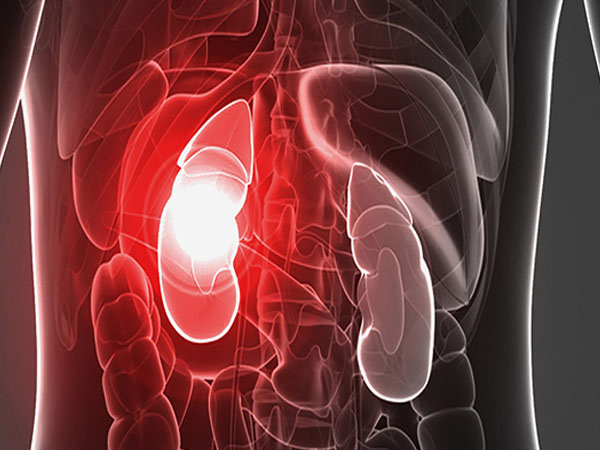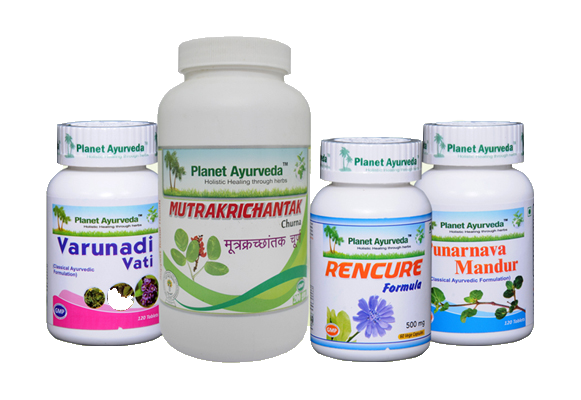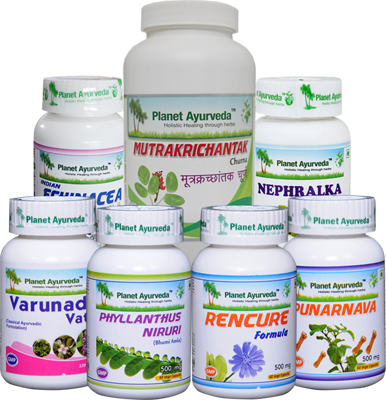Ayurvedic Treatment of Kidney Disorders – Avoid Dialysis
Overview
Kidneys are reddish-brown bean shaped organs in our body. It is located on both sides in the retroperitoneal space at a slightly oblique angle. Right kidney is slightly lower than the left kidney and also smaller in size than the left. Kidneys receive about 1300ml of blood per minute. Kidneys contain approximately one million Nephrons, which is the structural and functional unit of kidneys. The main functions of kidneys are to filtration the blood and excrete the waste products through urine and maintain electrolyte balance in our body. In this article we will discuss the Ayurvedic Aspect of Kidney Disorders.
Introduction
Kidney disorders means your kidneys are unable to filtrate the blood normally or unable to remove the waste particles from our body. Kidney problems include various health conditions such as glomerulonephritis, polycystic kidney disease, kidney stones, ureteric stones, chronic kidney disease, urinary tract infections, nephrotic syndrome and ultimately leads to kidney failure.
Kidney disease affects the body system badly. It will affect the body’s ability to filter the blood and extra water from your body and hampers the blood pressure. It also affects the red cell production and vitamin D metabolism. In kidney disorders our kidneys are not able to excrete out the waste from the body. So that the waste products and fluid can build up in your body and cause swelling in your ankles, face.

Etiology/Causes
Kidney disorders are generally caused in these conditions
- Diabetes
- Family history
- Recurrent kidney infections
- Hypertension (high blood pressure)
- Cardiac disorders
- Aging
- Any kidney injury
- Drug toxicity
- Smoking
- Prolonged obstruction of urinary tract due to any ureteric stone or prostatitis or cancers
Clinical Features/Signs and Symptoms
Kidney disorders easily go unnoticed until the symptoms become severe. So the common clinical features of kidney disorders are:
- Poor appetite
- Nausea and vomiting
- Fluid retention
- Constant fatigue
- Increase or decrease in the frequency of urine
- Hyponatraemia (decrease sodium level in blood)
- Hyperkalemia (rise in potassium level in the blood)
Ayurvedic Aspect of Kidneys
In Ayurveda we termed kidneys as Vrikka. Vrikka is made from rakta (blood) and medha (fat) dhatu. Vrikka is the source for Medovaha strotas. So anything which affects the Rakta and Medha dhatu will affect the functioning of the kidneys and one example for this is Prameha (Diabetes). When kapha dosha blocks the strotas (channels) i.e. mutravaha strotras which further leads to various kidney problems. Now we will discuss the Raktavaha and Medovaha strotas dushti.
Raktavaha Strota Dusthi (Blocked Blood Channels)
Causes Of Vitiated Raktavaha Strotas1

This shaloka states that when a person eats unfavourable or contaminated food, consumption of excessive hot or liquid food stuffs, excessive exposure to sun and fire and wind then raktavaha strota get vitiated and cause kidney disorder.
Medovaha Strotas Dusthi (Vitiated Fat Tissue)
Causes of Medovaha Strotas Dusti2

This shaloka states that the medovaha strotas are affected due to lack of exercise, day sleep, intake of too much fatty food and excessive alcohol consumption.
Treatment for Vrikka Roga (Kidney Disorders)
Ayurveda is a part of ancient traditional medicine which is derived from knowledge and wisdom of Ayurvedic Acharyas and this path has served the patients since 5000 years. Ayurveda is the ancient and pure form of treatment which treats the disease from its root cause.
This ancient pathway treats the patients without any side effects. Allopathy doctors believe that kidney disorders are neither reversible nor they do have permanent treatment. They said that disease progress could be slowed but after reaching the end stage the only solution for this disease lies in dialysis and at last kidney transplant.
But Ayurvedic experts believe that kidney diseases are not only reversible but also treatable if detected earlier. Ayurveda divides the human body according to doshas (vata, pitta, kapha) and dhatus (rasa, rakta, mansa, meda, asthi, majja, sukra). Unlike allopath, Ayurveda doesn’t focus on treating the symptoms of the disease but also treats the whole body. For the treatment of kidney disorders we have to manage or open or clear the blocked channels of Raktavaha and Medovaha strotas
Treatment of Vitiated Raktavaha Strotas3

This shloka states that in the diseases caused by vitiated Raktavaha strotas (kidney disorders) one should do the treatment which evacuates the blood and do procedures like purgation, fasting and blood-letting.
Treatment of Vitiated Medovaha Strotas4

Above quoted shaloka means that for this condition we should do emesis, purgation, blood-letting, physical exercise, fasting, sudation, herbal formulated smoking. Use of haritaki (Terminalia chebula) powder with honey and mostly use rough food grain.
At Last We Have To Follow Pathya or Apathya Ahara-Vihar To Manage This Disease
Pathya Ahara (Favourbale Food)
People Who Are Suffering From This Condition Must Follow The Following Diet Chart
- Red rice
- Wheat
- Raddish
- Ochra
- Goat milk
- Ghrit
- Amla (Emblica officinalis)
- Banana
- Grapes
- Coconut water
- Jaggery
Apathya Ahara (Unfavourable Food)
Patients Must Avoid Following Food Items
- Tila (Sesamum indicum)
- Urada (Vigna mungo)
- Kulthi (Macrotyloma uniflorum)
- Curd
- Salt
- Sour products
- Avoid fish consumption
Pathya Vihara (Favourable Lifestyle)
One Must Follow This Lifestyle for Managing Kidney Disorders
- Do light exercises
- Morning and evening walk
- Apply sandalwood paste over body
- Detoxification of body by vamana (induced vomiting)
- Get exposure to cold wind
Apathya Vihara (Unfavourable Lifestyle)
One Must Avoid These
- Exposure to sunlight and fire
- Suppresses the natural urges
- Heavy exercise
- Sudation therapy
Some Yogasana And Pranayama Are Also Helpful In Kidney Disorders. Some of the Yogasana and Pranayama Are
Yogasana
- Chakraasana
- Gomukhasana
- Vajrasana
- Dhanurasana
Pranayaamas
- Bhastrika pranayama
- Kapalabhati
- Nadi shudhi
These Asana Are Followed By 5 Minutes Of Shavasana. These Must Be Done For Approx 5-10 Minutes.
Planet Ayurveda
Planet Ayurveda provides herbal products for the treatment of kidney disorders.This is the manufacturing company which manufactures various herbal products for the treatment of various disorders. These herbal products are made from pure and standardized products of natural and potential herbs and made under the guidance of expert ayurvedic physicians. These are 100% natural and vegetarian products. All these herbal products are made from natural herbs with ancient time tested formulas.
Planet Ayurveda provides 2 packs for kidney disorders.
- Revive kidneys pack
- Revive kidneys pack for advanced stages
1. Revive Kidneys Pack

This Pack is Beneficial in Mild Symptoms of Kidney Disorders.
This Pack Includes
- Varunadi vati
- Mutrakrichantak churna
- Rencure formula
- Punarnava mandoor
2. Revive Kidneys Pack for Advanced Stages

This Pack Is Helpful In Severe Cases of Kidney Problems
This Pack Includes
- Mutrakrichantak churna
- Varunadi vati
- Rencure formula
- Punarnava capsules
- Phyllanthus niruri
- Echinacea capsules
- Nephralka capsules
Conclusion
At last we concluded that by following these ayurvedic regimens one can get permanent relief from kidney diseases. As said above that according to allopath kidney disorders are irreversible and have no permanent treatment. But in Ayurveda there is a treatment for kidney disorders without any side effects. These herbal remedies are very effective in the Treatment of Kidney Disorders and save patients from harmful dialysis and transplantation procedures.
References
- Charaka vimansthan 5/13
- Charaka vimansthan 5/15
- Charaka sutrasthan 24/18
- Charaka sutrasthan 23/8-9


